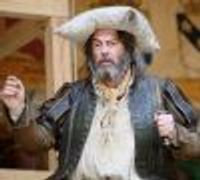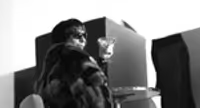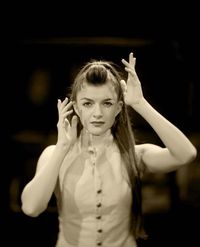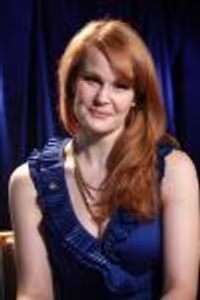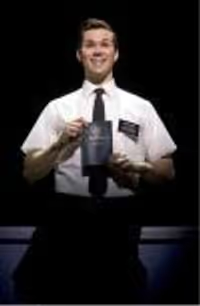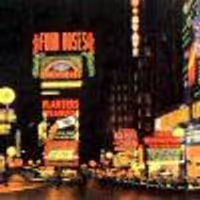My thoughts on ENRON
Yankeefan007
Broadway Legend Joined: 3/20/04
#1My thoughts on ENRON
Posted: 5/8/10 at 7:46pm
I've been mildly obsessed with Lucy Prebble's play ENRON since I read it some months ago. I wondered: how would it play in America? Would the characters come off as sympathetic? Would Americans have any particular desire to see a play based on one of the greatest economic disasters in history?
The answers, after seeing ENRON, are: Not well, no, and, ultimately no.
I very much enjoyed Rupert Goold's technologically stunning production, but it's no wonder why it will close tomorrow after only a few weeks.
Is it the play? Sort of. The play is dramatically inert, with characters who are, to put it mildly, unsympathetic. Prebble charts the rise and fall of the company, choosing to focus on the executives: Jeffrey Skilling, Ken Lay, Andy Fastow and Claudia Roe, an amalgamation of women. The people behind me, residents of Houston, Texas, Enron's hometown, talked at length throughout the intermission about how the play would benefit from having human characters, the 'regular Joes' who lost it all. I couldn't help but agree.
The script itself is far too "inside baseball," as it were; mind-numbing in terms of all the business terminology used.
As far as stagecraft goes, this is the closest thing I can think of to putting AVATAR on stage. It's just one jaw-dropping moment after another. The cast, also, is quite fine, with good (though hardly the best) performances from Norbert Leo Butz as Skilling, Stephen Kunken as Fastow, Marin Mazzie as Roe and Gregory Itzen as Lay.
It doesn't play well in America for a variety of reasons, starting with the simple question "who wants to go see a show about this?" We're not strangers to it as they are in Britain, plus there, it's satiric. There's no way that the satire would go over well on these shores, despite some thrilling ideas: Arthur Anderson as a ventriloquist and his dummy, Lehman Bros. as Siamese Twins in a giant suit and a board of directors full of blind mice.
I do think, however, that it could have succeeded in two forms: either a) as a limited engagement at BAM with the original London cast or b) a limited engagement on Broadway with the original London cast. London casts seem to have some mystique; I'd never heard of any one of the history boys before seeing the show, but there's something thrilling about the phrase "original cast."
I also think that, if it were billed as a musical, it wouldn't be closing...
Updated On: 5/8/10 at 07:46 PM
#2My thoughts on ENRON
Posted: 5/8/10 at 7:57pm
The accents of the London cast were pretty grating in London, I dread to think what they would have sounded like to a New Yorker - and to be honest, I think that the original cast opening the show in New York would have made people even more likely to question why a bunch of Brits were telling Americans their own story (if you see what I mean).
I do think Goold is a wonderful director with a quite incredible imagination, but I do think that it's backfired a little here - unlike his productions of plays by Shakespeare or other great writers, all that his brilliant ideas end up doing here is showing up the lack of brilliant ideas in Prebble's text.
Updated On: 5/8/10 at 07:57 PM
#2My thoughts on ENRON
Posted: 5/8/10 at 7:59pmI think Marin saying she "appears to be running", taking a tissue, spreading her legs and wiping her vagina will go down (in my mind at least) as one of the most unforgettable things I've ever seen on stage. We can never go back to before.
#3My thoughts on ENRON
Posted: 5/8/10 at 8:01pm
Check out this thread and click on the links the posts. Some interesting stuff.
https://forum.broadwayworld.com/readmessage.php?boardid=1&boardname=bway&thread=1015527#4010606
#4My thoughts on ENRON
Posted: 5/8/10 at 8:09pm
I think Marin saying she "appears to be running", taking a tissue, spreading her legs and wiping her vagina will go down (in my mind at least) as one of the most unforgettable things I've ever seen on stage. We can never go back to before.
At the Royal Court, which is where this play had its London premiere before going to the West End, that line probably seemed completely innocuous! (This was the theatre that premiered Shopping and F*CKing.) It's almost a fashion.
It's easy to say that this show failed because it was bad, but it seemed to be well on the way to failing before people even saw it and the issue of whether it was any good or not even arose. It was just something people had no interest in seeing on stage, regardless of how well- or badly-done it was - the fact that it didn't appear to be any good was just the last nail in the coffin. I could be wrong, but that's the impression I'm getting.
Updated On: 5/8/10 at 08:09 PM
#5My thoughts on ENRON
Posted: 5/8/10 at 8:11pmI am just glad Stephen Kunken received his well-deserved Tony nomination.
#6My thoughts on ENRON
Posted: 5/8/10 at 8:13pm
I saw Stephen Schwartz and Duncan Shiek there the other night. I guess they wanted to see just what kind of score they should be writing. ![]()
#7My thoughts on ENRON
Posted: 5/8/10 at 8:21pm
I am just glad Stephen Kunken received his well-deserved Tony nomination.
Oh me too!
Midnight Radio
Broadway Star Joined: 5/26/07
#8My thoughts on ENRON
Posted: 5/8/10 at 8:25pm
I also saw Enron this afternoon. Without a question, the most unique theatrical experience I have yet had the pleasure to attend. It was nothing short of breathtaking from start to finish. The show was polished, inventive, witty, bitingly satirical, and carried out with the greatest degree of care and professionalism.
This is not a show to be soon forgotten. In my opinion, this is the Assassins of our generation. Hopefully one day it will be fully appreciated in the states. I am so glad I jumped at seeing this.
Updated On: 5/8/10 at 08:25 PM
leefowler
Broadway Star Joined: 7/13/04
#9My thoughts on ENRON
Posted: 5/8/10 at 9:31pm
If Enron had in fact been written by an American author, and been directed and designed by an American team, does anyone think it would have then been a hit?
For my money, Enron failed because it wasn't very good, not because of any resentment about it's English creative team.
#10My thoughts on ENRON
Posted: 5/8/10 at 9:50pm
If Enron had in fact been written by an American author, and been directed and designed by an American team, does anyone think it would have then been a hit?
Most of the audience probably has no idea the play is written and directed by Brits.
As for its success or failure, I think the biggest problem is it opened here two years too late. By now, America has moved past the Enron collapse- there's a new administration in the White House, people have moved on to new scandals, etc.
Updated On: 5/8/10 at 09:50 PM
#11My thoughts on ENRON
Posted: 5/8/10 at 10:21pm
I saw Stephen Schwartz and Duncan Shiek there the other night.
I was there that night too! Stephen Flaherty and Kim Grigsby were also in the audience.
#12My thoughts on ENRON
Posted: 5/8/10 at 10:32pm
I think Marin saying she "appears to be running", taking a tissue, spreading her legs and wiping her vagina will go down (in my mind at least) as one of the most unforgettable things I've ever seen on stage. We can never go back to before.
Amen. And if we're going to go there...Norbert in under armour running on a treadmill. Yes.
romgitsean
Broadway Star Joined: 4/7/08
#13My thoughts on ENRON
Posted: 5/8/10 at 10:40pm
"I also saw Enron this afternoon. Without a question, the most unique theatrical experience I have yet had the pleasure to attend. It was nothing short of breathtaking from start to finish. The show was polished, inventive, witty, bitingly satirical, and carried out with the greatest degree of care and professionalism.
This is not a show to be soon forgotten. In my opinion, this is the Assassins of our generation. Hopefully one day it will be fully appreciated in the states. I am so glad I jumped at seeing this."
Midnight Radio, I agree with you 200%. I was also there at the matinee- I got the last Enron logo T-shirt :P
I'm going to post all my thoughts in a vlog tomorrow night when I come home from New York. If you hated the show, you won't like my vlog.
Also: Schwartz and Sheik were there Friday? F*CK me! I wish I saw them...but then again, I might've freaked out. Are they planning on working on anything? I'd like to hear THAT score :)
Next On The List :: Clybourne Park, Once, Streetcar, BOM
#14My thoughts on ENRON
Posted: 5/8/10 at 11:30pmThey were there on Thursday, unless they saw it two days in a row haha.
Chrysanthemum62001
Broadway Legend Joined: 2/14/04
#15My thoughts on ENRON
Posted: 5/8/10 at 11:54pmI saw it this afternoon as well, and also loved it. Though I can't imagine paying around 120 bucks to see it!
#16My thoughts on ENRON
Posted: 5/9/10 at 12:12amI'm really at a loss as to why people loved this play so much. I thought it was "ok". I can definitely see why it's closing. It's not the kind of show that the audiences needed to keep a Broadway show open are going to flock to. And to be honest, if Marin wasn't in it, I wouldn't have rushed to it when I found out they were closing and I see EVERYTHING.
emg_sound
Understudy Joined: 5/3/06
#17My thoughts on ENRON
Posted: 5/9/10 at 12:30am
I'm still on the fence about the show, having seen it last night... I wasn't bored at any time, but I was never completely enthralled. Since I work in design, though, I had enough to look at to keep me interested when the text got too didactic.
I'm going to go out on a limb, though, and say that this show will bring in some Tony hardware, since it's the only play nominated with an extensive sound design (Cork's work on Red was serviceable, and I forgot there was a sound designer for A View from the Bridge midway through the second act [Admittedly, Scott Lerher does some brilliant work with musicals, but VftB was so subtle it practically wasn't there]).
#18My thoughts on ENRON
Posted: 5/9/10 at 12:33am
I forgot there was a sound designer for A View from the Bridge midway through the second act [Admittedly, Scott Lerher does some brilliant work with musicals, but VftB was so subtle it practically wasn't there]
That's the work of a good sound designer- when it sounds so natural you can't even tell the difference. It's the main reason I love the South Pacific sound design.
#19My thoughts on ENRON
Posted: 5/9/10 at 12:35am
"As for its success or failure, I think the biggest problem is it opened here two years too late. By now, America has moved past the Enron collapse- there's a new administration in the White House, people have moved on to new scandals, etc. "
That's not entirely true. If it is fantastic, the subject matter of Enron and its collapse would bounce back into people's minds. Two years after a collapse like that and what it did isn't too late. If they did a show about Madoff five years from now and it was fantastic or not, people will know who Bernie Madoff is. Sure, the original hype of what happened with Enron may have fizzled, but the event itself is still recent history and people remember it very very well.
#20My thoughts on ENRON
Posted: 5/9/10 at 2:49am
I'm not sure it was too late so much as too early for this play (which I admittedly really liked). Or maybe a bit of both. Sometimes I think a show has to come out practically as the event is happening or when enough time and distance has passed for it to become interesting to people again. It's different in London because Enron wasn't a UK company so they'd take the story differently.
That said, I still think it deserved a far better run here, and I also agree that having a British cast here would have definitely raised eyebrows considering it's a British play about Americans being put on in America.
bob h2
Swing Joined: 5/9/10
#21My thoughts on ENRON
Posted: 5/9/10 at 7:27am
I think there is a large potential audience for this kind of play as many men who avoid the theater perk up when the subject is money and business.
Friends with good taste in theater were about equally split on this play; many really liked it.
The British are often moralistic and judgemental about Americans, and when I saw this tone in "Enron" I knew it would have trouble.
#22My thoughts on ENRON
Posted: 5/9/10 at 1:20pm
"The British are often moralistic and judgemental about Americans, and when I saw this tone in "Enron" I knew it would have trouble. "
regardless, the tone would or should have been the same no matter who wrote it. it isn't a show that should be prettied up really. it was a terrible and ruthless thing that happened.
#23My thoughts on ENRON
Posted: 5/9/10 at 1:57pm
...a few thoughts of my own
The real problem, for me, was the play, whose message was as subtle as a sledgehammer. I found the parade of easy metaphors tiring, sophomoric and just so literal: blind mice as willfully blind board members, velociraptors as formulas that consume debt, blind justice represented by a blindfolded person holding a scale. Much was made of the cleverness of the Lehman Brothers being portrayed as a pair of conjoined twins. What point did that make? If there were actually any Lehman brothers around during Enron's rise (there weren't, by the way, no Lehman family members have been involved with the company since 1969 [thanks 5 seconds on Google!]) what is the joke behind their being joined? Any individual company usually operates as a single unit. Now, if several different financial institutions were portrayed as being in lock-step together (maybe a chorus line of them tied at the ankles), that's a joke I get.
The funny thing is, I thought the HBO documentary "The Smartest Guys in the Room" was more entertaining. Prebble and Goold clearly studied "The Smartest..." very closely--there is a scene in the film where stock prices are superimposed on Skilling's face, an effect used over and over in the play. The film is filled with clips offering wry commentary on the narrative: a scene about Enron creating profits out of thin air, is intercut with 5 seconds of old black and white footage of a magician pulling a rabbit out of a hat: an unexpected and funny blip of commentary to lubricate the dry facts. Goold and Prebble have similarly intercut the play with bits like their light saber and traders dances, the line dance and the commodities chorale. The problem is many of the "numbers" are not a part of the tale being told--most don't even really comment on the action. And they tended to be too long. I can imagine a draft of the play including: "The action will now stop, and traders will sing jargon and numbers related to trading aluminum, gold and pork bellies." When this particular number ended, the afternoon I saw the show, there was a long pause, followed by a smattering of confused applause when the audience realized that it was over and no real point had been made. (The general audience reaction to the play that day was abysmal. I felt terrible for the cast.)
Many critics found the design and effects in the show to be remarkable and innovative. To me, the show looked kind of cheap for 5 million dollars. I saw the de rigueur projections, constant use of the age-old transparent scrim and ten seconds of pyrotechnics. Some beautiful tube-shaped hanging lights and lighted floor panels created some nice pictures, however.
What I did appreciate was a very talented cast and crew giving it their all to make a flawed piece of theater work. That made my ticket price worth paying and always will.
emg_sound
Understudy Joined: 5/3/06
#24My thoughts on ENRON
Posted: 5/9/10 at 5:38pm
adamgreer...
For a Traditional (R&H, Sondheim, etc.) MUSICAL, forgetting there's a sound designer can be important (that being said, Dan Moses Schrier pulled some amazing tricks in ALNM in placement of the orchestra throughout the theatre... definitely a design choice), I acknowledge that completely (Hence my comment for Scott Lehrer's brilliant work in Musicals) For a straight play however, the concept of a sound design has a greater emphasis upon Content, Enron has that in spades, View From the Bridge had what sounded like no more than two dozen sound cues, naturalistic and done well, but nothing particularly special.
My apologies to all for threadjacking.
Videos


